Higher education leaders grapple with difficult challenges as artificial intelligence tools spread on campus, but they think there will eventually be better student learning outcomes as teaching models change.
The spread of artificial intelligence tools in education has disrupted key aspects of teaching and learning on the nation’s campuses and will likely lead to significant changes in classwork, student assignments and even the role of colleges and universities in the country, according to a national survey of higher education leaders. The survey was conducted Nov. 4-Dec. 7, 2024, by the American Association of Colleges & Universities (AAC&U) and Elon University’s Imagining the Digital Future Center.
A total of 337 university presidents, chancellors, provosts, rectors, academic affairs vice presidents, and academic deans responded to questions about generative artificial intelligence tools (GenAI) such as ChatGPT, Gemini, Claude and CoPilot. The survey covered the current situation on campuses, the struggles institutional leaders encounter, the changes they anticipate and the sweeping impacts they foresee. The survey results covered in a new report, Leading Through Disruption, were released at the annual AAC&U meeting, held Jan. 22-24, 2024, in Washington, D.C.
Resources
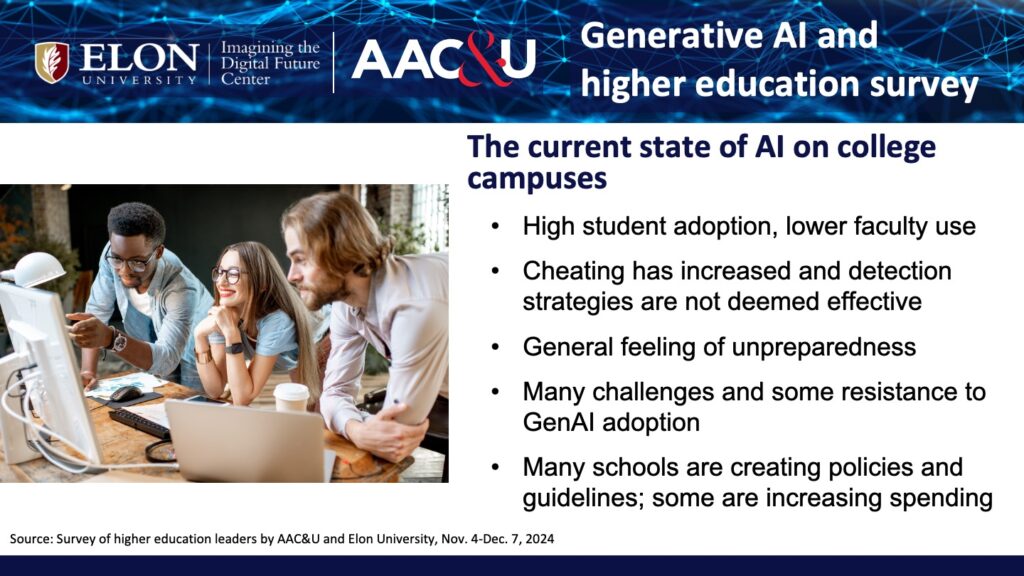
Current situation
- High student adoption of GenAI, lower faculty uptake: Most of these higher education leaders say GenAI use by students for coursework is prevalent, with 89% estimating that at least half of students use the tools. Meantime most say that much smaller numbers of faculty use GenAI as part of their jobs, with 62% estimating that fewer than half of faculty use the tools.
- Some 83% of the academic leaders in this sample say they themselves use GenAI tools – and a portion of them are power users who use GenAI for a wide range of activities. The most common uses by these executives were for writing and communications, information gathering and summarization, idea generation and data analysis.
- Unpreparedness: Majorities of these college and university leaders believe their institutions are not very or not at all ready to use GenAI for such things as: preparing students for the future (56% say their schools are not prepared for this); preparing faculty to use GenAI for teaching and mentoring (53% feel unprepared); and helping non-faculty staff use these tools for work (63% feel unprepared). Some 59% believe last spring’s graduates were not prepared for work in companies where skill in using GenAI tools is important.
- Cheating increase: 59% of these leaders report that cheating has increased on their campuses since GenAI tools have become widely available; 21% say it has increased a lot.
- Peer comparisons: 38% perceive their own institutions to be about average in using GenAI for teaching, learning and other activities, while 28% say their schools are below average and 7% say they are far behind.
- Challenges to making progress: Large majorities of these leaders cite specific hindrances to GenAI adoption and integration at their schools. The challenges most often mentioned include faculty unfamiliarity with or resistance to GenAI, distrust of GenAI tools and their outputs, and concerns about diminished student learning outcomes.
Most of these leaders say their institutions have taken some steps to adjust to the rise of GenAI. Some 69% report their schools have adopted written policies about appropriate and inappropriate uses of GenAI tools in learning and teaching. In addition, 44% report they have created new classes specifically devoted to AI, and a fifth have created majors or minors in AI.
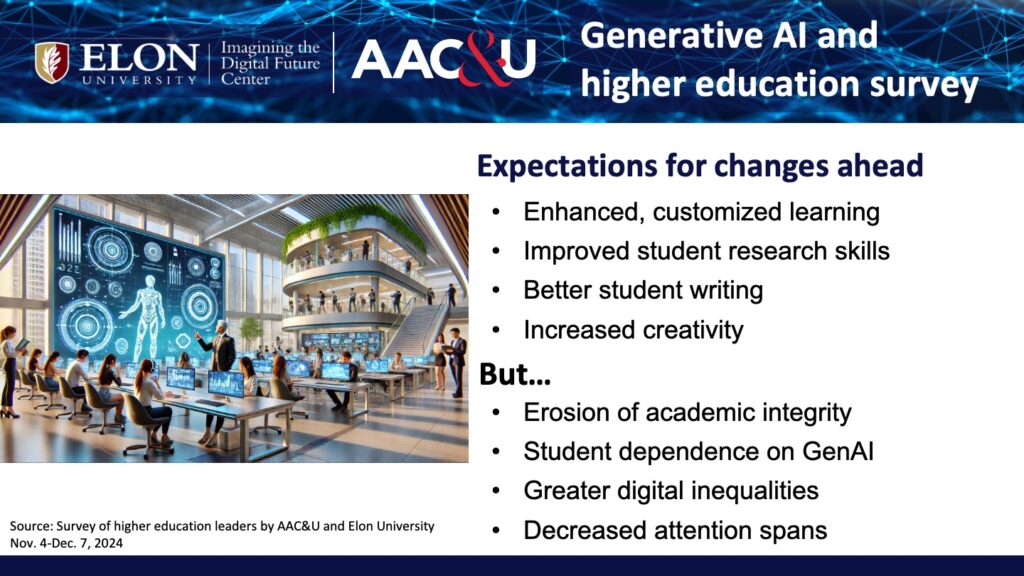
Changes ahead
Asked to assess the impact of GenAI tools on students’ academic lives, these leaders expressed optimism mixed with concerns. The positive outcomes they foresee include:
- Enhanced learning: 91% think GenAI tools will enhance and customize learning, including 47% who believe there will be a lot of impact.
- Improved research skills: 75% think the tools will improve student research skills, including 29% who believe there will be a lot of impact.
- Better student writing: 69% think the tools will increase students’ ability to write clearly and persuasively, including 27% who believe there will be a lot of impact.
- Increased creativity: 66% say the tools will increase student creativity, including 21% who believe there will be a lot of impact.
The negative consequences include:
- Concerns about academic integrity: 95% of these leaders say concerns about the academic integrity of students will be affected by the spread of GenAI tools, including 56% who believe there will be a lot of impact.
- Dependence on GenAI: 92% think GenAI tools will lead to overreliance by students on the tools, including 44% who think there will be a lot of impact.
- Greater digital inequities: 81% of these leaders think GenAI will have an impact on digital divides, including 36% who think there will be a lot of impact.
- Decreased attention spans: 66% think GenAI will diminish student attention spans, including 24% who think the tools will have a lot of impact on this.
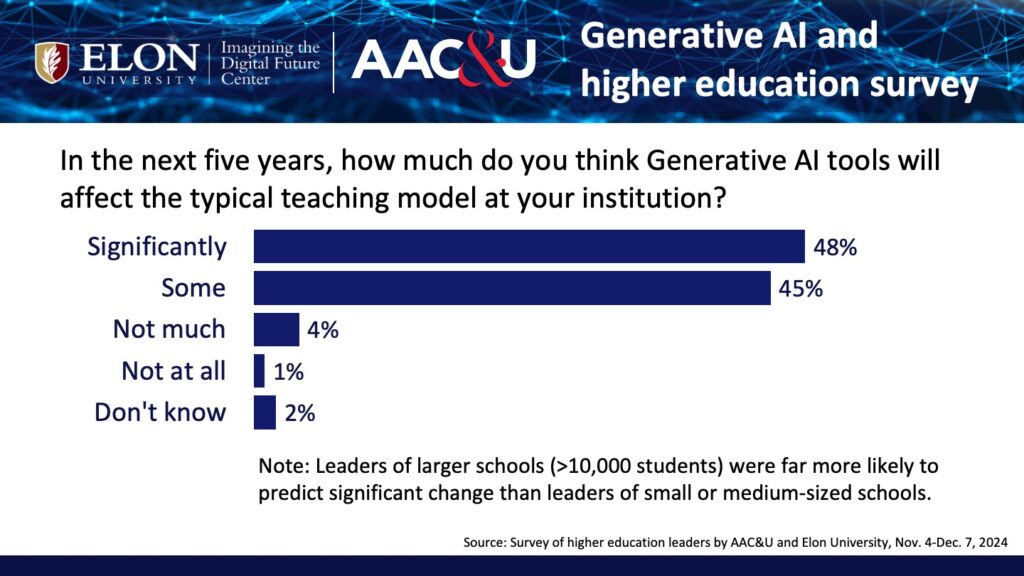
Some key findings about other changes that will occur at their institutions:
- Changed teaching model: 95% of these leaders say the teaching models at their schools will be affected significantly or to some degree. Nearly half (48%) believe the change will be significant.
- Classroom focus on ethical issues raised by the rise of GenAI tools: Strong majorities of these officials believe it is very necessary to have a classroom focus on major issues tied to GenAI, including privacy issues, hallucinations, misinformation, bias, data breaches, and the alignment of the tools with human values.
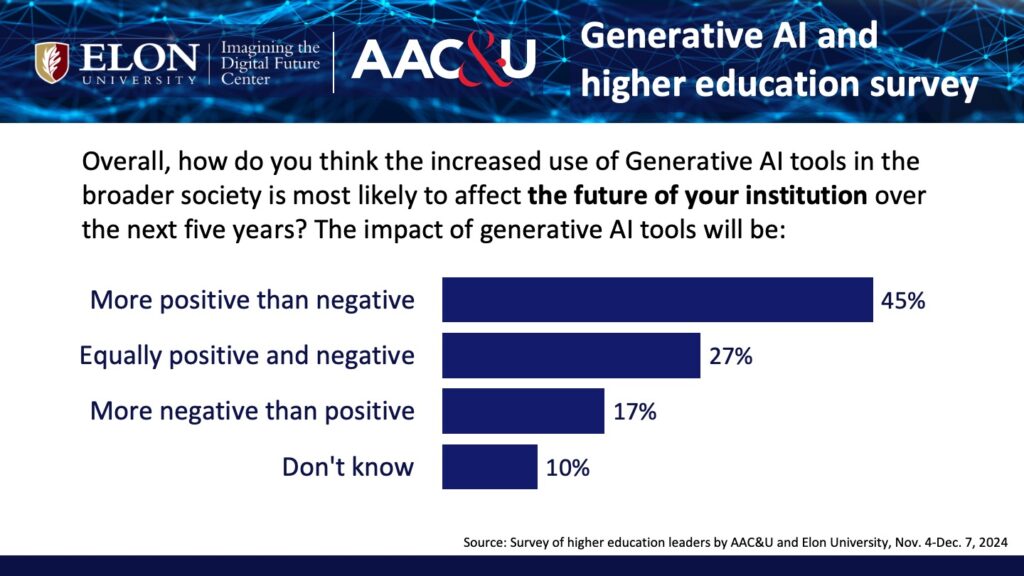
Future impacts
- Better learning outcomes: A fifth of these academic leaders (21%) say student learning outcomes will get a great deal better at their schools in the next five years because of GenAI tools and another 46% think the change will be somewhat for the better.
- Students’ lives will be positively affected: Asked about the impact of GenAI on the overall lives of students, 50% of these academic leaders say the impact will be more positive than negative in the next five years, compared with just 12% who believe the impact will be more negative than positive.
- Assignments, teaching, learning, and research will get better: 70% of the leaders in this survey say the quality of assignments to students will get a lot or somewhat better because of the use of GenAI tools; 68% think the tools will relieve faculty of routine work they now face; and 68% think the tools will help faculty research. Another 54% think the quality of lectures and lessons will improve thanks to GenAI and 51% say the quality of feedback and grading of student performance will improve.
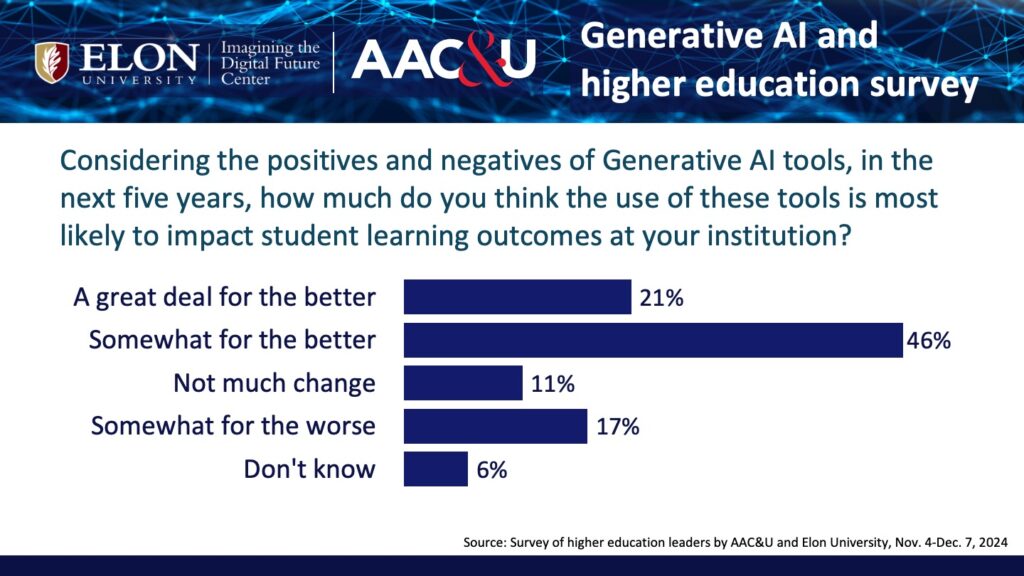
A persistent concern on campus relates to jobs. These college and university leaders say some reductions in employment levels could occur, but it will mostly be minor: 29% say they expect reductions in the number of staff at their schools (only 3% say it will be major), while 11% expect reductions in faculty and teaching assistants (only 1% say it will be major). In both cases, about a fifth of these respondents say they do not know yet what the impact on staffing levels will be at their schools.
Methodology
The results reported here are from a non-scientific survey of academic leaders known to the American Association of Colleges & Universities and a supplemental list of key officials in higher education compiled by Elon University. In all, 337 college leaders responded to at least some portion of the survey, which was conducted via Qualtrics between Nov. 4 and Dec. 7, 2024. It is a diverse sample in key respects, including by the size of the undergraduate population of schools and the geographic distribution of the schools. Still, the results are not generalizable to all of higher education.
For additional information, contact co-authors:
Lee Rainie, director, Elon University’s Imagining the Digital Future Center | lrainie@elon.edu
C. Edward Watson, vice president for digital innovation, AAC&U | watson@aacu.org


